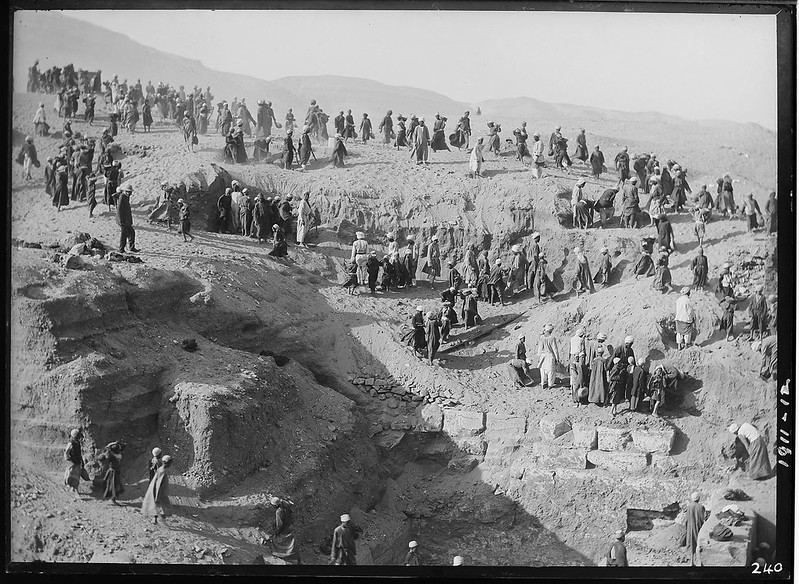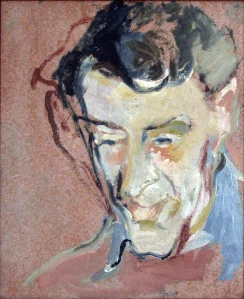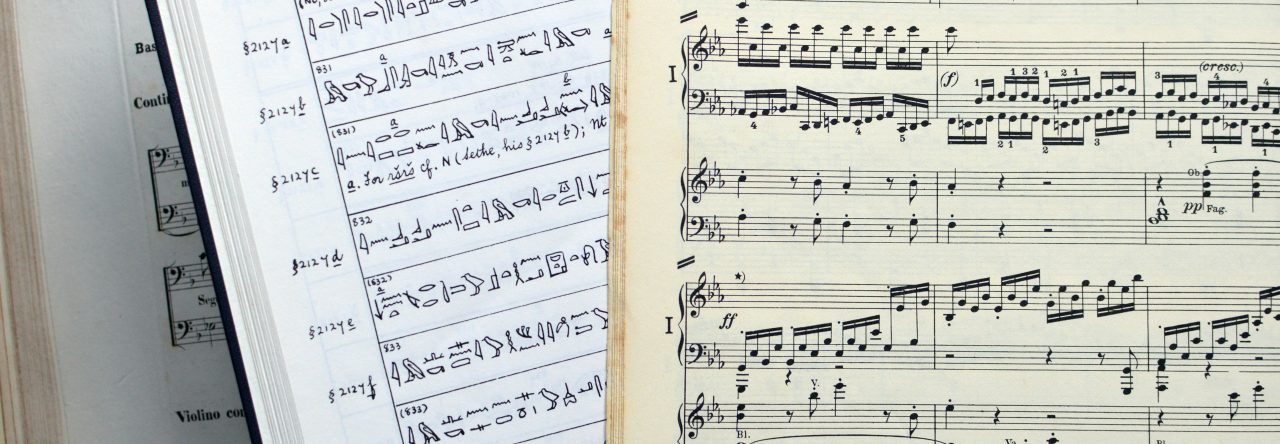Along with music, Egyptology was Dr Anderson’s principal scholarly interest, and providing support for students of Egyptology was among his priorities for the Trust from the time of its establishment. Since then the Trust has welcomed dozens of Egyptologists to its house in Kensington to spend a month in London’s Egyptological libraries, museums and archives as part of its visitors’ programme. We are delighted to announce the inauguration in 2024 of a new initiative to provide support to an Egyptian student of Egyptology over a longer period: The Joan Hawkins Resident Egyptology Scholarship.

Dr Anderson during an early visit to the temple of Hatshepsut, Deir el-Bahri, Egypt.
Mrs Hawkins was a friend of Dr Anderson whom she met on a Nile cruise which he had joined as a guest lecturer. Taking an interest in the Trust from the start of their friendship, she left a substantial legacy to support its work, and the Trustees have felt that it would be right to remember that generosity by naming the new scholarship after Mrs Hawkins, in recognition of her commitment to supporting students of Egyptology.
The first holder of the Hawkins Scholarship, our first Resident Egyptologist, is Amany Abd el-Hameed, a PhD student at Helwan University, Egypt.

The first Joan Hawkins Resident Egyptologist, Amany Abd el-Hameed, outside the British Museum, January 2024
Amany will spend six months in London. She will live at the Trust’s house in Kensington and spend her time undertaking research in collaboration with the Egypt Exploration Society (EES) into the archive of documentation arising from the Society’s archaeological work at Abydos in the early twentieth century. The project is entitled ‘Abydos: Reuniting the Archives’ and focuses on the overlooked narratives of Egyptian archaeological labour at Abydos. In so doing, this research aims to weave stories of Egyptian labour into the rich tapestry of archaeological endeavours at the site. The objective is to shed light on the histories of Egyptian labour, to represent, for the first time, the work of the hundreds, potentially thousands of Egyptian men and boys who dug, shaped, filled and conditioned the site that we encounter today.

Egyptian members of the EEF team at Abydos in 1914. From the archives of the Egypt Exploration Society. Image from Abydos (AB) sub-archive. AB.NEG.13.036a. Available online the Society’s archive at flickr.com. Courtesy of the Egypt Exploration Society.
Amany will be researching the excavations initiated by the EES (Egypt Exploration Fund (EEF) prior to 1919) at Abydos, which ran from 1899 to 1947. From 1967 to the present day, the site has been excavated by an expedition of Pennsylvania and Yale universities (Penn-Yale). Amany seeks to address the history of archaeological excavations at Abydos across the past 125 years, a period which covers the colonial (1882-1919), semi-colonial (1919-1954), and postcolonial (1954 – present) eras of modern Egyptian history. The extensive archaeological work conducted at Abydos over the last 125 years has revealed that it was one of the most important ancient Egyptian sites across more than three millennia. The project provides a point of reflection on the archaeological work conducted by the EEF/EES-funded projects in the early- to mid-20th century, the knowledge produced, the methods developed there, and the histories of archaeological labour.

Egyptian excavators working as part of the EEF expedition at Abydos in 1911. From the archives of the Egypt Exploration Society. Image from Abydos (AB) sub-archive. AB.NEG.11.240. Available online the Society’s archive at flickr.com. Courtesy of the Egypt Exploration Society.
The archival material will be used to explore how Egyptian labour has enabled and constrained the creation of Abydos as a contemporary heritage site. Furthermore, Amany seeks to demonstrate how heritage management projects at Abydos have often failed to address or actively suppressed the contributions of local Egyptian labour, and how revealing the “hidden” histories of Egyptian labour might affect the development of future heritage management at Abydos, as the site seeks World Heritage status. Finally, the EES’ long engagement with Abydos provides an interesting lens for tracing the place of archaeology in the colonial labour regimes, the politics of international co-operation, and the contest between colonial states and neo-imperial interests.

Amany in the archives of the Egypt Exploration Society.
The Trust is extremely grateful to our friends at the Egypt Exploration Society, in particular to the Director, Dr Carl Graves for proposing the project and to Dr Stephanie Boonstra for all her assistance in making the material available to Amany. Dr Anderson was associated with the Society for many years, serving as its Honorary Secretary from 1970 to 1982 and we are sure he would have been delighted that the new scholarship embodies such close connections between the Society and Trust.

Amany with Director of the EES, Dr Carl Graves, and Trust Director, Dr Chris Naunton outside the Society’s offices.
Amany received the EES Centenary Award for 2023/2024, the funds from which she used to organise a conference entitled ‘Uncovering Abydos‘ held at the British Council in Cairo in December 2023, and among Amany’s responsibilities as the Hawkins Scholar she has been asked to share the results of her work in a public lecture to be given during her stay in London. Details will be posted to this page and to the Trust’s social media (see here) in due course.
As a consulting scholar at Penn Cultural Heritage Amany received the Director’s field fund 2023/2024 award from Penn Museum to conduct a research project on the Penn-Abydos Archives, exploring the relationship between the Penn Museum, the EES and Abydos. The archives include the Sara Yorke Stevenson collection, which contains her correspondence with the English archaeologist Flinders Petrie who worked at Abydos for the EES, and the Egypt Exploration Fund (EEF) collection which contains correspondence between the Penn Museum and the EEF regarding objects and excavations in Abydos . Amany will present some results of her research here: ‘The Hidden History of Egyptian Labor in Abydos’ for Penn Cultural Center. To register please see here.

Amany at the EES.

